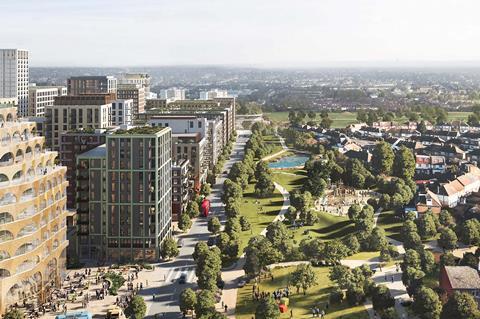Property Week editor Liz Hamson joins Argent senior partner and Argent Related chairman David Partridge to discuss the company’s Brent Cross Town scheme and the impact of the pandemic on the climate agenda.

It is fair to say 2020 has not panned out the way people had hoped on the climate front. There are obvious fears that the whole climate agenda could be derailed by the Covid-19 pandemic – the same way the sustainability agenda was in 2008 by the financial crisis. For some, the pandemic has in fact accelerated the agenda. Take Argent Related for example, one of Property Week’s Climate Crisis Challenge partners, which recently pledged that its Brent Cross Town development will become a net-zero-carbon town by 2030 at the latest.
Watch the full video below:


LH: What exactly does Argent Related’s pledge mean in practice right now, against the backdrop of a global pandemic and a deep and potentially lasting recession?
DP: We were pursuing this agenda long before the pandemic and have been for many, many years. We do not see the pandemic or indeed a recession, which might come off the back of it, as changing our approach at all.
The fundamentals of what we have been building into the Brent Cross Town proposition have not really changed in the past six months, as we have been working on the project for about five years. We know it is going to take a long time to happen, so we have to be resilient and sustainable in the way we choose to build it.
We have partnered with a Swedish organisation called Vattenfall to provide an onsite district heating system, which will deliver carbon-free heating of all our homes and offices. Off the back of that, we will be able to deliver carbon-free air conditioning and electricity as well. So operationally, we are a lot further down the line. The really critical piece is around embodied carbon in construction, which is much tougher because everybody uses concrete and steel and glass, which generate a lot of carbon.
LH: How have you adapted your thinking to meet the embodied carbon challenge?
DP: What we are thinking is to explore all the new technology coming out at the moment around low-carbon concrete. We are also looking at timber construction, certainly in office buildings. Currently, that is not something we can do for taller residential buildings, for obvious reasons. But for all our commercial space, we see that as a possibility.
We are looking at all the different technologies that are out there and are aiming to take on as much of that as we can. And then we are also pursuing offsetting as an absolute last resort to get to net zero.
LH: Is offsetting still an important part of the conversation?
DP: Yes, I think it is an essential part. It will be impossible not to generate some carbon in everything we do. Ultimately, offsetting is a good solution. I think there are a number of issues around the certification of the offsetting, such as making sure that it really is actually delivering what people say it should be; whether you offset yourself or whether you look to other organisations to do it for you. All these things we are pursuing but as a last resort so, yes, I think it will be part of the equation.
LH: What are your thoughts on carbon trading?
DP: I think carbon trading and carbon offsetting are going to end up being the same thing. I think in a sense by trading it and using where somebody else is perhaps carbon-positive might be a way of balancing the equation overall.
LH: Argent is known worldwide for its Kings Cross scheme. How will your experience at King’s Cross help you deliver on this 2030 pledge?
DP: I do not think we could even contemplate what we plan to do at Brent Cross if we had not done the work we have been doing at King’s Cross over the past 20 years. At King’s Cross, we do already have an onsite district heating system that provides air conditioning to around a quarter of the site; we deliver 100% of our heating; and more than 80% of the electricity is effectively generated onsite. This has allowed us to achieve massive carbon savings.
We could not contemplate Brent Cross if we had not done the work at Kings Cross
We have a 23% lower carbon footprint for our office workers. More than 25% – or one in four – of the BREEAM ‘Outstanding’ buildings in the UK are located at King’s Cross. This is a result of the pioneering work with the district heating network that we put in. It has allowed us to understand exactly how it works and the economics behind it.
LH: Is it an evolving strategy or have you achieved everything you wanted to achieve? What is next?
DP: The strategy evolves all the time. First of all you have to put that hardware in. Fortunately, at King’s Cross we had 60 acres to be able to link all the pipes and wires and engines. It is something we have been able to replicate at Brent Cross Town. But the key is going to be the way these buildings are occupied and then feed that knowledge into the next generation of office buildings that we design.
LH: How receptive are occupiers to your input? Are they all on board or are they pursing their own ambitious targets?
DP: They are absolutely on board. Companies like Facebook have already committed to be net zero; they have built this into their own business strategies and are making their own pledges. The best way for them to be able to make those pledges is for these occupiers to be able to look to their landlords already making headway.
We see this as a competitive advantage, because if occupiers see we are on the same page as them it will be easier for them to fulfil their own pledges.
LH: Why do you think ESG has become so important in the boardrooms of real estate businesses in particular?
DP: I think it is crucial and there are a number of reasons behind it. Investors have finally cottoned on that this is important and a better way of protecting their investment. Also, the people who work in these various organisations are demanding it, too. People are going to be making choices based on the values that they see in the brands they are purchasing and working for, and everybody is beginning to realise at last.
LH: What do you think the impact of Covid-19 will be on this in the short and medium term?
DP: Every time I speak to government, they talk about a bounce-back that includes a sustainable approach to climate change. They are absolutely insisting that it is part of the economic recovery and renewal.
I am also hearing that from investors and from the banks that are looking to make loans to begin to support the renewal. They are all insisting on it being included in anything we do for plans that go beyond the next few months. And so, while it is not perhaps in the public mind for obvious reasons, it is definitely going on.
LH: There is talk of a ‘green recovery’. How do you see that panning out over the next 12 months or so?
DP: I think that coming off the back of Covid-19 could be a great moment and capture a zeitgeist of positive thinking, and there is going to be a tonne of investment, then the reskilling of workers for new jobs.
All these things can be done within a climate agenda as an absolutely fundamental approach. ‘A society grows great when old men plant trees in whose shade they will never sit.’





























No comments yet